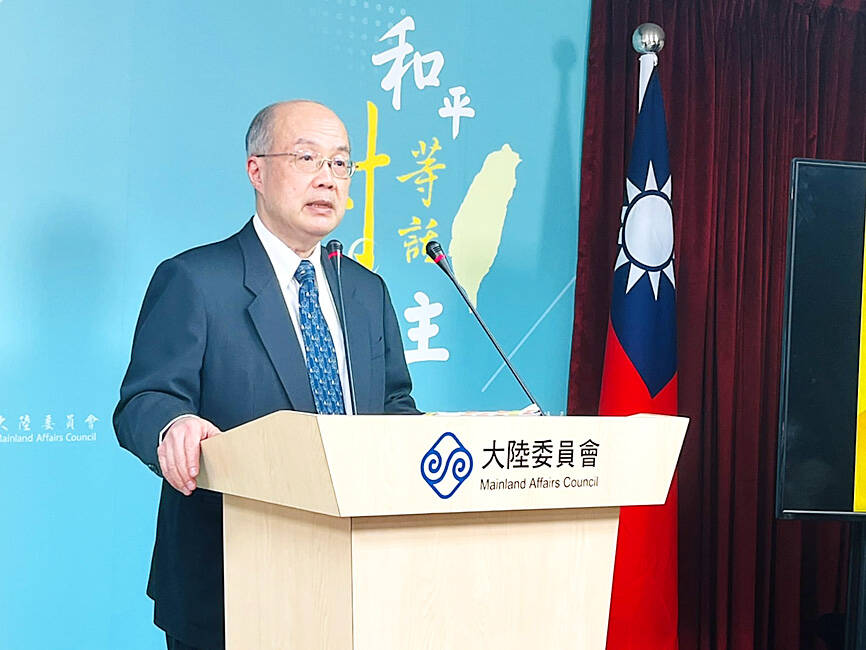More than 80 percent of Taiwanese object to Beijing “buying off” Taiwan’s diplomatic allies, oppose the “one country, two systems” framework and are against Beijing claiming that Taiwan is a part of China, a Mainland Affairs Council (MAC) poll issued yesterday showed.
About 83.7 percent of respondents said that the government should have positive and orderly cross-strait interactions that benefit the economy.
Nearly 79 percent of respondents support bolstering security screening of Chinese coming to Taiwan while restoring a semblance of interaction with China, while 84.3 percent said that Chinese jets crossing into Taiwan’s air defense identification zone disrupt regional stability and safety.

Photo: Chen Yu-fu, Taipei Times
About 75.5 percent do not recognize Beijing’s “one China” principle,” which demonstrates that Taiwanese steadfastly oppose Beijing’s attempts to suppress the nation’s sovereignty, the council said.
About 85.5 percent said that cross-strait interaction should be based on mutual respect and dignity.
About 85.1 percent said that Taiwanese should determine the nation’s future, and 88.4 percent support government endeavors to bolster self-defense.
The council urged Beijing to respect the opinions of Taiwanese and abandon attempts to “divide and conquer” via its “united front” rhetoric.
Beijing must recognize that both sides are independent of each other, it added.
Separately, council spokesman Jan Jyh-horng (詹志宏) said the office of former president Ma Ying-jeou (馬英九) has the prerogative of negotiating by what title he is referred to during his planned visit to China starting beginning on Monday.
Ma Ying-jeou Foundation executive director Hsioa Hsu-tsen (蕭旭岑) previously said that if Ma and Chinese President Xi Jinping (習近平) were to call each other “president,” it would be a tacit confirmation of what former president Lee Teng-hui (李登輝) called in 1999 a “special state-to-state relationship.”
Ma should be aware that his visit has the potential to convey to Beijing the majority Taiwanese opinion on cross-strait relations, and highlight Taiwan’s resolve to uphold its democratic sovereignty, Jan said.
Regarding Ma’s visit being planned so closely to President Tsai Ing-wen’s (蔡英文) trip to Guatemala, Belize and the US, Jan said Ma’s office could explain the timing.

The Coast Guard Administration (CGA) yesterday said it had deployed patrol vessels to expel a China Coast Guard ship and a Chinese fishing boat near Pratas Island (Dongsha Island, 東沙群島) in the South China Sea. The China Coast Guard vessel was 28 nautical miles (52km) northeast of Pratas at 6:15am on Thursday, approaching the island’s restricted waters, which extend 24 nautical miles from its shoreline, the CGA’s Dongsha-Nansha Branch said in a statement. The Tainan, a 2,000-tonne cutter, was deployed by the CGA to shadow the Chinese ship, which left the area at 2:39pm on Friday, the statement said. At 6:31pm on Friday,

The Chinese People’s Liberation Army Navy’s (PLAN) third aircraft carrier, the Fujian, would pose a steep challenge to Taiwan’s ability to defend itself against a full-scale invasion, a defense expert said yesterday. Institute of National Defense and Security Research analyst Chieh Chung (揭仲) made the comment hours after the PLAN confirmed the carrier recently passed through the Taiwan Strait to conduct “scientific research tests and training missions” in the South China Sea. China has two carriers in operation — the Liaoning and the Shandong — with the Fujian undergoing sea trials. Although the PLAN needs time to train the Fujian’s air wing and

STRIKE: Some travel agencies in Taiwan said that they were aware of the situation in South Korea, and that group tours to the country were proceeding as planned A planned strike by airport personnel in South Korea has not affected group tours to the country from Taiwan, travel agencies said yesterday. They added that they were closely monitoring the situation. Personnel at 15 airports, including Seoul’s Incheon and Gimpo airports, are to go on strike. They announced at a news conference on Tuesday that the strike would begin on Friday next week and continue until the Mid-Autumn Festival next month. Some travel agencies in Taiwan, including Cola Tour, Lion Travel, SET Tour and ezTravel, said that they were aware of the situation in South Korea, and that group

Taiwanese celebrities Hank Chen (陳漢典) and Lulu Huang (黃路梓茵) announced yesterday that they are planning to marry. Huang announced and posted photos of their engagement to her social media pages yesterday morning, joking that the pair were not just doing marketing for a new show, but “really getting married.” “We’ve decided to spend all of our future happy and hilarious moments together,” she wrote. The announcement, which was later confirmed by the talent agency they share, appeared to come as a surprise even to those around them, with veteran TV host Jacky Wu (吳宗憲) saying he was “totally taken aback” by the news. Huang,